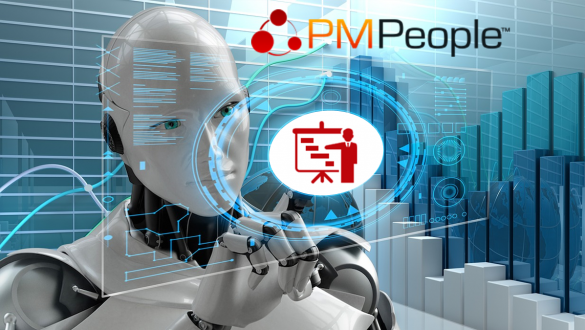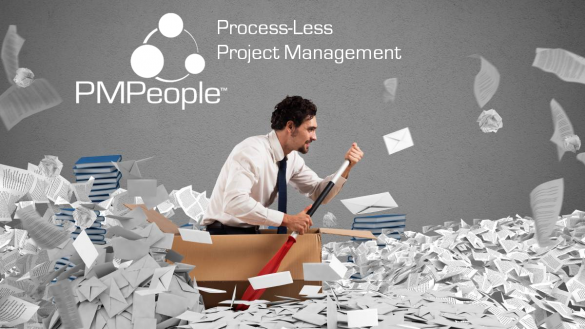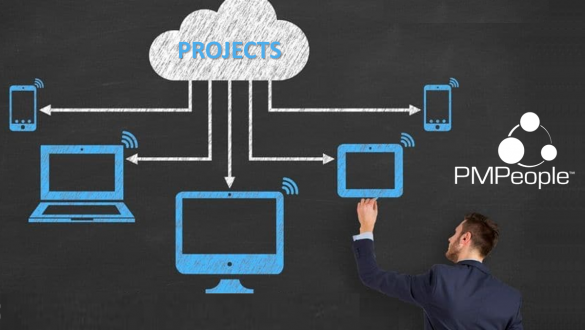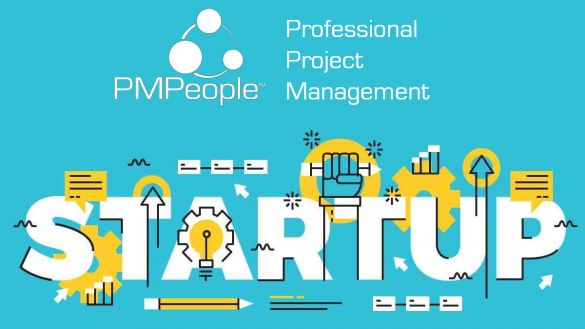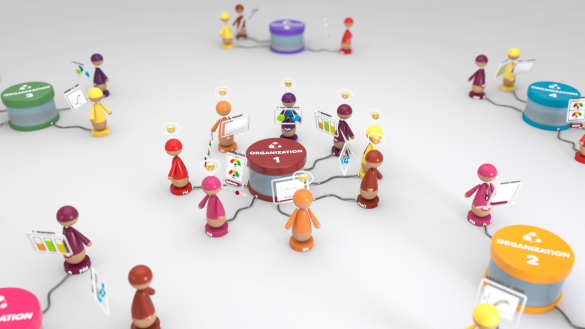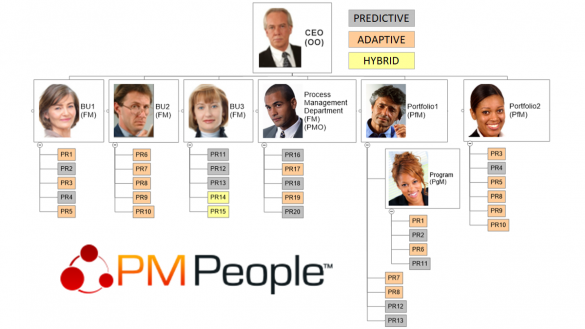The Process-less, Value driven PMO
The PMO must strive to deliver value. One way to make the PMO much more effective without increasing its resources is to shift the management burden to project teams. This mission can begin by promoting three simple habits in the Project Manager: 1) Generate easy and frequent project status reports; 2) be accountable in regular project review meetings, and 3) serve to multiple stakeholders who monitor the project at their convenience.
Antipatterns to Implement a PMO
To govern 50-500 projects in execution, Project Management Offices should delegate project management to responsible professionals who ensure the success of each project, capable of being accountable, anticipating problems, and proposing and executing corrective actions before it’s too late. Antipatters emerge when the PMO is not designed by a project manager: Organizations fail to achieve the goal of improving project management maturity, convince executives that PMOs are cost centers that don’t add value, discourage stakeholders engagement, and close doors to project professionals. The most common antipatterns in PMO implementation are: 1) the IT specialist, 2) the consultant, 3) the process expert, and 4) the data scientist.
Artificial Intelligence in Project Management Tools
As IA has already transformed the digital advertising industry, we believe it can also plan projects, elaborate reports, assign tasks, automate notifications and recommendations, evaluate people’s performance, discover issues, analyze trends, and so on. However, it is still too early to talk about artificial intelligence in the field of professional project management. In order for software to assist us in planning baselines, tracking progress, suggesting actions, anticipating issues, evaluating performance, etc., it is essential to have a historical database of projects within the organization’s context, on the organization’s private servers.
Process-Less Project Management
Managers don’t buy project management. They approve projects but don’t assign anyone to oversee the big picture, anticipate problems, make forecasts, be accountable, and ultimately, take responsibility for achieving success. They see that the project team self-manages through meetings, which they sometimes attend for information and other times to address issues on the fly. A project professional would know how to do it better, but since we have a reputation as bureaucrats (documents, processes, workflows, and more meetings), they prefer crises, that is, reacting by improvising when problems arise and it’s too late.
Value Driven Project Management
While a project is on execution, the project professional makes decisions to optimize value delivery, which will come during the operational stage—well after the project has been closed. Value delivery is straightforward in agile projects, as management relies on continuous interactions with stakeholders who validate increments toward the final result. In predictive projects, it is possible for value to be delivered after a failed project, or vice versa: the project succeeds but no value is delivered. Through role-based collaboration, PMOs can delegate many project management activities, having more time to anticipate issues and deliver value.
Projects in the Cloud
Most professionals are always connected. Knowledge workers are used to collaborating on objects in the cloud: they alternate their laptop, tablet, or mobile phone, to work concurrently on the same version of the document, spreadsheet, presentation, article, web design, software code, prototype, etc. No need to download, install, send, merging changes, etc. All of them working together on the same version of the truth. In the project economy, it is also time to digitize management, knowledge and interactions between people working on projects, programs, and portfolios.
Is your PMO producing Reports or delivering Value?
Most PMOs are seen as internal cost centers adding bureaucracy to projects. PMPeople helps people collaborate on project management professionally, in the cloud, using different roles. PMOs can distribute many management activities, having more time for anticipating problems and delivering value. With PMPeople, the PMO can grow from being a cost center to lead the company in the Project Economy.
Startups need Professional Project Management
Startups need good ideas, but they can only succeed if they are good in execution, while turning ideas into reality. This means they need to manage projects professionally, avoiding bureaucracy, value driven, working as self-organizing teams of people collaborating proactively. Thanks to technology available nowadays, these people can access their projects online, use specific professional project management roles.
In the Project Economy, everyone has a voice
In the Project Economy, people can collaborate managing projects professionally, with project status reports, changes, risks, milestones, baselines, etc. PMPeople stands for “people collaborating on project management”. PMPeople is a freemium project portfolio management product. Organizations in the Project Economy can easily go digital with PMPeople. Get your projects professionally managed by people collaborating using different roles.
PMPeople to Control Agile Projects
1) Centralize professional project management in PMPeople: stakeholders engagement, risks, status reports, time sheets and expenses, etc. 2) decompose the project into work packages, meaning agile releases; 3) Connect work package #0 (the project itself) to Asana list for epics; 4) Connect each release to Asana list for user stories; 5) Managers do not need Asana: they use PMPeople to track epics and stories; 6) Team Members do not need PMPeople: they use Asana to follow their ceremonies and manage their artifacts.
Categories
- Business (16)
- Demand Management Roles (14)
- Frequently Asked Questions (7)
- Guide (26)
- People (23)
- Assignments (2)
- Feedback (2)
- Project Team (3)
- Tracking Time And Expenses (2)
- Process (9)
- Closing (2)
- Executing And Controlling (2)
- Planning (1)
- Project Management (67)
- Management Frameworks (18)
- Organization Owner (OO) (3)
- Project Economy (54)
- Tools (19)
- Supply Management Roles (5)
- Training (6)
- Uncategorized (1)





